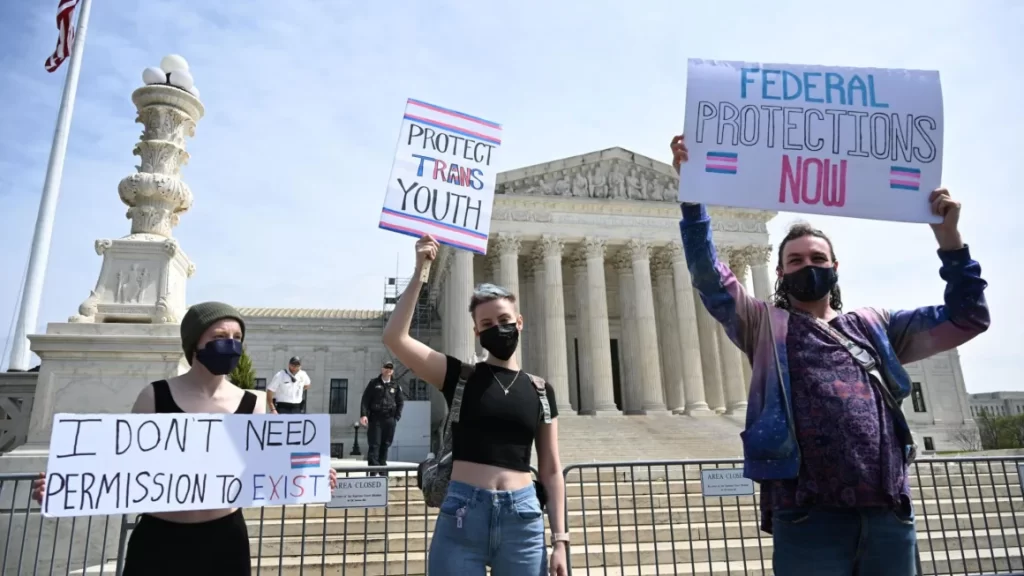
On December 4, 2024, the U.S. Supreme Court heard oral arguments in U.S. v. Skrmetti, a case challenging Tennessee’s ban on gender-affirming medical care for transgender youth. Three families with transgender youth and one medical provider filed a lawsuit against Tennessee Attorney General Jonathan Skrmetti and other state officials responsible for enforcing the ban, arguing that the law violated their equal protection rights by discriminating against them on the basis of their sex. Tennessee argues that it is exercising its power to regulate the practice of medicine for youth and is not distinguishing based on a patient’s sex.
The U.S. Court of Appeals for the Sixth Circuit previously upheld Tennessee’s ban. In its decision, the Court raised the issue of how courts should review state laws that single out transgender people for disfavored treatment, questioning whether courts should subject such laws to a more stringent review and whether such laws violate the fundamental rights of parents to make decisions about medical care for their children. The Supreme Court only accepted the initial question for consideration: whether state laws that limit medical care for transgender youth are a form of sex discrimination that is subject to heightened constitutional scrutiny.
At the Supreme Court, Solicitor General Elizabeth Prelogar and Co-Director of the ACLU’s LGBTQ & HIV Project Chase Strangio presented oral arguments in favor of a more stringent review of the law than that applied by the Sixth Circuit. General Prelogar asked the court to rule on the first-order question of whether the law classifies people based on sex. By her argument, if the Tennessee law contains a sex classification, courts must apply intermediate scrutiny to determine whether the law is necessary to advance a compelling state interest.
A majority of justices expressed skepticism about these arguments, and it appears likely that the Court will refuse to overturn the Sixth Circuit’s decision. Chief Justice Roberts and Justice Kavanaugh posed questions implying that legislatures are better positioned to answer questions about the “medical nuances” of gender-affirming treatments. In response to one such question, General Prelogar stated, “I think it would be a pretty remarkable thing for the Court to say that just because we're in the space of medical regulation, you are not going to apply the traditional standards that ordinarily are applied when there's a sex classification.”
Justice Kavanaugh also mentioned the difficulty of weighing risks to transgender youth who would not receive treatment under the ban against risks to “detransitioners,” a term used to describe people who stop or reverse their gender transition, who might regret receiving gender affirming treatment if the ban was overturned. Justice Alito also alluded to people who opt to detransition, asking if transgender status is immutable. Mr. Strangio responded, “I think that the record shows that the discordance between a person’s birth sex and gender identity has a strong biological basis and would satisfy an immutability test.”
Justice Kavanaugh repeatedly raised concerns that the Court’s decision in the case might have implications on women’s and girls’ sports. General Prelogar responded that the issue of sports raises a different set of government interests and if the majority wanted to “preserve space to make clear that nothing here should be understood to affect the separate questions” about sports teams and bathrooms, Prelogar said, “the court could very well do so.”
Although Tennessee’s ban only applies to minors, General Prelogar stressed that the state’s arguments in favor of the law could apply to much more sweeping bans on gender-affirming care. In response to Justice Kavanaugh’s affirmation that state legislatures could come to different conclusions about gender affirming care, General Prelogar emphasized that Tennessee’s arguments, “would equally apply to a nationwide ban if this were enacted by Congress.”
The Supreme Court could rule in several different ways. If the Court decides that the Sixth Circuit applied the correct and more deferential constitutional standard, it would allow the Tennessee ban to stand. While it remains to see what the Justices write, an opinion upholding the law could be tailored very narrowly to the issue of medical care for transgender youth, or written broadly in a way that gives states a license to enact laws that further limit or eliminate the rights of transgender people in healthcare and other areas of public life,. It is likely that the case will have implications for other areas of state laws prohibiting discrimination, particularly protections based on sex in employment and schools.
